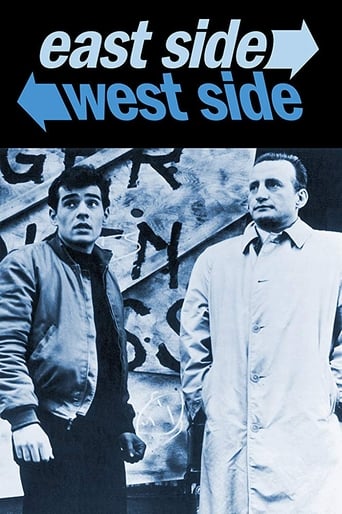Joseph Harder
Apparently , the early nineteen sixties was one of the under appreciated eras of TV history. It may not have been a " Golden age; but at least it was a silver one. It began with Newton Minow lamenting the fact that Television was a vast wasteland, it ( probably ) ended when Slattery's People left the airwaves for good. It was a period of interesting writing and of shows that were socially conscious without ( usually ) being preachy. While some of these programs are never rerun and are not even on DVD( Witness SLattery's People), East Side/West Side was actually rerun about seven years ago on the sadly departed TV network TRIO. Of course, It helped that East Side West Side starred a true legend of acting in George C. Scott. Unlike Slattery's People, which (usually) tried to be pretty optimistic, for all its ironic undercurrents, East Side West Side was gritty, melancholy and frequently downright depressing. I have only seen one full episode. I saw as part of a high school class on "Black America" It was the classic, widely banned, Who Do you Kill, with James Earl Jones. I still remember how well acted and written it was, and how utterly sad. Like Slattery's People, and (maybe) the even more obscure Channing, it deserves to be on DVD.
pfeffermuse
This was not George C. Scott's only television series, as someone stated elsewhere. While "East Side/West Side" is a brilliant drama with intelligent stories and an incredibly talented cast, George C. Scott was the lead in an abysmal FOX Channel series called "Mr. President" (1987). Both Mr. Scott and FOX would have liked to forget this programme.Also, as far as "Naked City", that series often did not have neatly tied-up endings. Often, the endings were left deliberately ambiguous to make the audience think. While certainly not the poster child for civil rights programming, "Naked City" did show a multi-ethnic NYPD, and there were often Hispanic and African-American characters/actors with sizable parts in individual episodes. I can't say that the episode "The Contract", about Chinese-Americans and the conflict of cultures was the greatest representation of Asians on television -- especially with James Shigata, Khigh Dhiegh and Abraham Sofaer all playing Chinese -- but the characters were treated with respect, and not as stock figures.
Miles-10
I saw one episode of this show during the 1990s at the NYC Museum of TV & Radio. I couldn't even tell you what it was about except that, considering it was done in the early 1960s, it was way ahead of its time. It had to do with a family's trouble facing the fact that it had serious trouble, and featured, I think, a self destructive daughter but it was probably something more shockingly specific. By the 1990s, what was shocking in 1963 almost seemed tame. By the way, who said George C. Scott played a *young* social worker? Did the Great Scott ever play somebody young? Along with other great shows of long ago (such as "Slattery's People"), this is one I wish that somebody would release on video/DVD.
jwarthen-3
Beautiful series-- a one-season long experiment that tried to reflect a tumultuous time-period (its single season encompassed JFK's death, the Civil Rights Bill, killings of Civil Rights workers in Alabama, escalation of fighting in Vietnam). George C. Scott played a social worker in Manhattan, Cicely Tyson his secretary, and before they softened the series toward the end toward whimsey, they produced at least three episodes that have stuck in my head for nearly 40 years: 1. social services take-away the child of a prostitute, who was portrayed as a devoted mother-- her grief was seismic; 2. a young black father who loses a baby to a rat's attack gets a weapon and wanders through Harlem looking for someone to kill; 3. a middle-class black couple moving to the suburbs sets off a calculated real-estate stampede, and even the liberal whites who sponsored them finally rebukes them. The second of these episodes was blocked-out in Georgia-- am surprised we got to see the other two; criticism at the time inevitably used the killing word "grim". Actors were drawn from the NY casting-pool, and shooting was done in the streets of the city.

